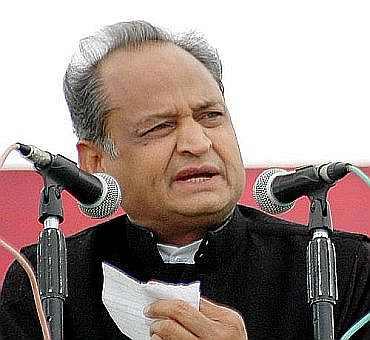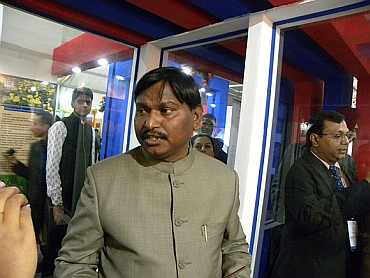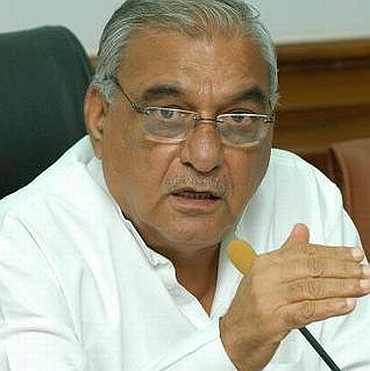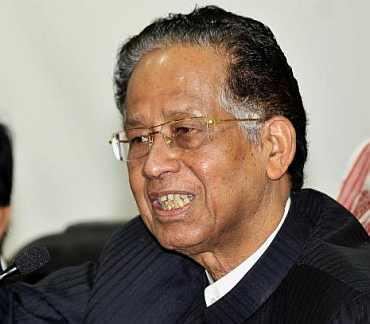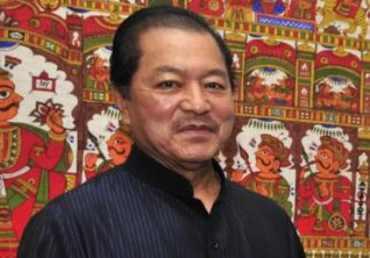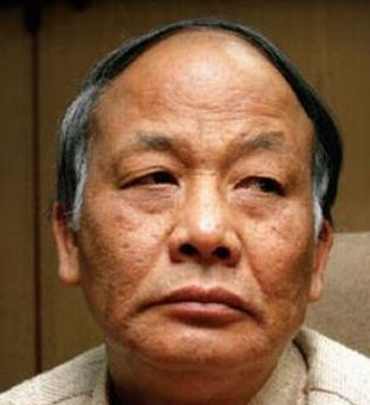This article was first published 13 years ago
Home »
News » The CMs who came in support of NCTC
The CMs who came in support of NCTC
Last updated on: May 5, 2012 22:23 IST
Image: Rajasthan Chief Minister Ashok Gehlot
After over six hours of heated discussions, the logjam over the National Counter Terrorism Body continued. A meeting in New Dellhi, attended by chief ministers of states, Prime Minister Manmohan Singh and Home Minister P Chidambaram on Saturday failed to arrive at a consensus over the contentious anti-terror body.
The chief ministers of the non-Congress-ruled states continued to oppose the proposal, while most Congress CMs gave it a thumbs up. Here's what a few chief ministers said in support of the NCTC.
Supporting the creation of NCTC, Rajasthan Chief Minister Ashok Gehlot said the proposed body does not "trample" upon the powers of the states.He made a few suggestions including that there should be two-way communication between the NCTC and the states and it should share information with them to make it more effective.
"I fail to understand how any of NCTC's functions would trample upon the already existing powers of the states... creation of the NCTC is the need of the hour," Gehlot said in his speech at the meeting of chief ministers on the NCTC. Noting that creation of NCTC was the "crying need" of the hour, the Rajasthan CM said terrorists were operating internationally and had the capability to strike in two to three states simultaneously where the local police will have limitations in collecting intelligence.
"They are not able to collect data at the national level nor do they have enough human resources that they can be sent to far off places to collect all relevant data. The state governments are not in a position to conduct an inter state operation despite their resolve. Only a national level agency like the NCTC, with adequate resources, technology and reach extending to the entire nation can conduct such operations," Gehlot said.
Terming the 26/11 attacks in Mumbai as an "eye opener", Gehlot said, "If we do not rise to the occasion and fight terror with all our might, posterity will never forgive us. It is essential for the states and Centre to march together in our fight against terrorism."
"The apprehension that the NCTC will adversely affect the federal structure and the Centre will become stronger at the cost of states needs to be shunned. In fact, such thoughts will never come to mind if we uphold the unity and integrity of nation as our primary concern," the Rajasthan CM said.
Citing the American example, he said after the creation of NCTC there in 2003 after the 9/11 attacks, there has been no major incident of terror which proves the utility of such a body.Seeking to allay fears of states regarding powers of NCTC, Gehlot said the body has been authorised to establish inter-state intelligence support team."
A standing council under the chairmanship of the director NCTC, too, has been proposed which would include chiefs of all state police. It is obvious that after the creation of these two, important decisions would be preceded by discussions with states," he said.Gehlot said the concerns regarding absence of prior consultation with states and the likely fall in coordination between states and the Centre are being addressed through this meeting.
...
Image: Jharkhand Chief Minister Arjun Munda
Jharkhand Chief Minister Arjun Munda suggested setting up a sub-committee to analyse and discuss the structure, powers and functioning of the proposed NCTC.
Extending support for setting up an organisation, which can effectively deal with the anti-national activities, Munda said, "The Kargil and Mumbai attacks have made it clear that terrorist activities in the country are being controlled from outside."
An effort is being made to create a system, which will effectively deal with terrorist activities in the country, he said, adding that "the Jharkhand government supports setting up of such an organisation."
Wondering why the Centre did not consult the state governments to seek their agreement before taking a decision on NCTC, Munda insisted that any such agency should be formed through an act of the Parliament. "Several anti-terror laws have been made from time to time and these were ratified in Parliament with consensus from the state governments. It is difficult to understand why such consultations were not held with the state governments before setting up the NCTC", he said.
Seeking discussions on the issue, Munda said, "The union government should set up a sub-committee to hold detailed discussions and analyse the structure, powers and function of the NCTC."
Image: Haryana Chief Minister Bhupinder Singh Hooda
Seeking to allay apprehensions that the NCTC would infringe on the states' rights, Haryana Chief Minister Bhupinder Singh Hooda said the standard operating procedure of the proposed anti-terror body would ensure that they are kept informed of all its operations.
"The Government of India has come up with a detailed standard operating procedure which ensures that the state governments concerned would be kept meaningfully informed of any operation undertaken by NCTC," Hooda said. He said that at the last chief ministers' conference the main objection of some state governments was related to the power of officers of the NCTC to arrest and search.
He said that the intention of the NCTC order was not to encourage its officers to operate independently, without the knowledge of the state governments. "A NCTC operation is to provide a powerful link to the states which would strengthen field level anti-terrorist operations in the states, allowing for adequate involvement of the state agencies," the Congress leader said.
"I would propose that intensive training should be given to the state and NCTC personnel jointly, so that intelligence gathering and field operations are carried out with perfect synchronisation," he said.
Hooda stressed on the need to provide adequate financial and technical resources to the states to ensure that the state intelligence wings and operations units, including the Anti-Terrorism Squads, are properly equipped and match the standards of the central agencies. The chief minister suggested that the state police and CID officers should also be taken on deputation in the NCTC.
Image: Assa, CM Tarun Gogoi
Congress Chief Minister Tarun Gogoi of Assam also wanted that Centre should take into confidence the states before undertaking operations. "I support the NCTC, but with conditions," he said.
Significantly, Bharatiya Janata Party leader and Chhattisgarh Chief Minister Raman Singh said they would support NCTC if their suggestions are incorporated and NCTC is suitably amended.
Image: Mizoram Chief Minister Lal Thanhawla
Mizoram Chief Minister Lal Thanhawla supported a pan-India institutional mechanism to synergise core competencies in counter terrorism and objective assessment of threats and challenges. He downplayed the issues raised by various states on giving the power to arrest and seizure and lack of accountability of the proposed anti-terror body saying that the
"The NCTC will be under the control of the Union Ministry ofHome Affairs" and "will be accountable to Parliament".Criticising those opposing it, Thanhawla said, "I beseech those who opposed NCTC to review their perceptions and urge upon the Government of India to make NCTC operational expeditiously".
Image: Manipur Chief Minister Ibobi Singh
Also favouring the proposal, Manipur Chief Minister Ibobi Singh suggested the NCTC officials share intelligence with the state police and carry out joint operations for arresting and detaining any person suspected of indulging in terrorist activities.
"The person arrested be handed over to the nearest police station and interrogated jointly. A similar provision in the Armed Forces Special Powers Act, 1958 whereby security forces hand over apprehended persons to the state police, has come under severe criticism for misuse and many cases of human rights abuse have been reported", Singh said.
Supporting the Centre for its credible step to neutralize terrorist and anti-national forces from within and outside the country, the chief minister said, "representations from all concerned agencies will, we presume, enable it (NCTC) to act in consonance with the federal ethos of our polity".
Supporting the NCTC, Maharashtra Chief Minister Prithviraj Chavan today said the anti-terrorbody was evolutionary and appealed one and all to rise above party considerations to back the initiative.
"India also needs an effective counter terrorism mechanism," Chavan told the meeting of chief ministers on the NCTC and pointed out that many developed and democratic countries like the United States, the United Kingdom, Japan and Germany have also set up institutions to counter terrorism.
On the Standard Operating Procedures, he said the provisions of Standing Council and Focus Group provide adequate safeguards to allay the fears expressed by a fewstates.
Source:
PTI© Copyright 2025 PTI. All rights reserved. Republication or redistribution of PTI content, including by framing or similar means, is expressly prohibited without the prior written consent.
